Publikationen
-
 Paradoxien des Auditiven? Ambiguitäten und Diskrepanzen beim Hören und in der Musik
Paradoxien des Auditiven? Ambiguitäten und Diskrepanzen beim Hören und in der MusikIn der Psychologie der Musik und der auditorischen Grundlagenforschung wird von „Paradoxien des Hörens“ beziehungsweise „musikalischen Paradoxien“ gesprochen (Deutsch 1986, 275–280; Utz 2015, 22–52; Deutsch 1995). Aber können Höreindrücke wirklich paradox sein? Was sollte es genau heißen, „Paradoxien zu hören“ oder gar „paradox zu hören“? Wir werden dieser Frage im Folgenden nachgehen und dabei zunächst den Begriff der Paradoxie für den gegenwärtigen Kontext schärfen – n ämlich im Sinne einer Ambiguität und einer Diskrepanz. Anschließend erarbeiten wir dazu eine Typologie, die zugleich auch die grundlegende Bedeutung aufzeigt, die insbesondere Ambiguitäten für die Musik – genauer: für den anhaltenden Reiz von Musikstücken – haben.
-
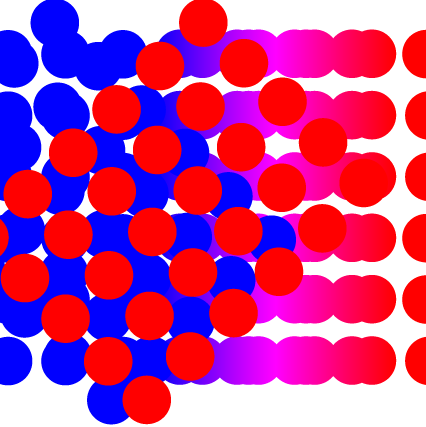 Transnational-wehrhafte Demokratie. Zu den Voraussetzungen eines Parteiverbotsverfahrens im Mehrebenensystem
Transnational-wehrhafte Demokratie. Zu den Voraussetzungen eines Parteiverbotsverfahrens im MehrebenensystemAm 13.11.2024 hat eine Gruppe aus 113 Abgeordneten des Deutschen Bundestags einen Antrag auf die Initiierung eines Parteiverbotsverfahrens gegenüber der „Alternative für Deutschland“ (AfD) eingebracht. Die bisherige Debatte konzentriert sich schwerpunktmäßig auf die Voraussetzungen und Erfolgsaussichten eines (Teil-)Verbots der Partei aus grundgesetzlicher Perspektive (insbesondere hier und hier). Dabei droht die nationale Brille den Blick auf die transnationalen Interlegalitäten zu verzerren und dem Stand der europäischen Integration nicht gerecht zu werden.
-
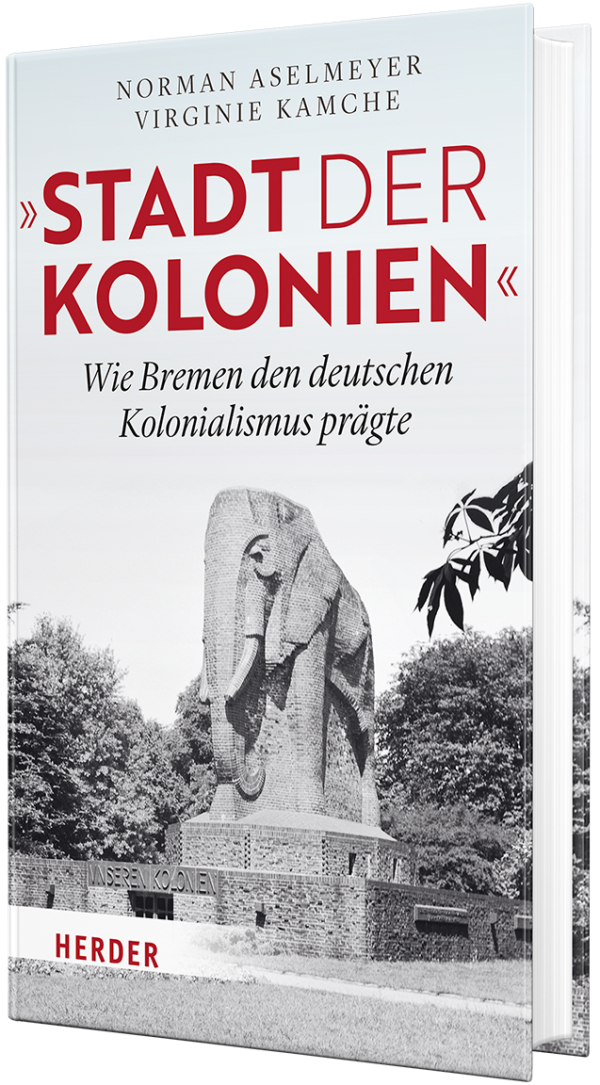 Die Überseestadt: Spiegel kolonialer Verhältnisse
Die Überseestadt: Spiegel kolonialer VerhältnisseDie Bremer Überseestadt, zwischen 1875 und 1913 als neuer Hafen errichtet, spiegelt die engen Verbindungen zwischen Hafeninfrastruktur und europäischem Kolonialismus wider. Der Anstieg des Warenumschlags, insbesondere von Kolonialwaren, führte zur Notwendigkeit neuer Hafenanlagen und zur Weserkorrektion. Trotz der Umwandlung in ein modernes Stadtviertel bleibt die koloniale Vergangenheit bis heute unzureichend reflektiert. Der Text fordert eine Sichtbarmachung der kolonialen Verstrickungen als integralen Bestandteil der Handelsgeschichte Bremens.
-
 Die Zeit in ihrer Vielfalt denken – Anmerkungen aus philosophischer Perspektive
Die Zeit in ihrer Vielfalt denken – Anmerkungen aus philosophischer PerspektiveCorona-Infektionen, Kindheitserinnerungen, Präsidentschaftswahlen, Lawinenabgänge: Alles, was wir erfahren und erleben, und sämtliche äußeren Geschehnisse können zeitlich – gemäß ihrem Nacheinander – angeordnet werden. Zeit ist also ein Ordnungsparameter, oder eine Dimension, von Ereignissen. Was Zeit außerdem noch ist, darüber herrscht Uneinigkeit auf dem „Kampfplatz ewiger Streitigkeiten“ – wie Kant die Philosophie (genauer: die Metaphysik) einst nannte2: Ist Zeit relativ oder absolut? Ist sie kontinuierlich oder diskret? Ist sie eine eigene Substanz oder konstituiert sie sich durch Beziehungen zwischen Ereignissen?3
-
 Staged Dissent – »Change My Mind« as a Vehicle of Instrumental Deliberation within the Identitäre Bewegung Österreich
Staged Dissent – »Change My Mind« as a Vehicle of Instrumental Deliberation within the Identitäre Bewegung ÖsterreichIn diesem Beitrag beabsichtigen Jonas Trochemowitz und Lara Herford, das Gesprächsformat Change my Mind von Steven Crowder und dessen Adaption durch den ehemaligen Sprecher der rechtsextremen Identitären Bewegung in Österreich zu analysieren. Anhand des Konzepts des ›Dissens-Genres‹ gehen wir der Frage nach, wie Werte eines deliberativen Demokratieverständnisses strategisch genutzt werden, um rechtsextreme Positionen im Diskurs zu legitimieren.
-
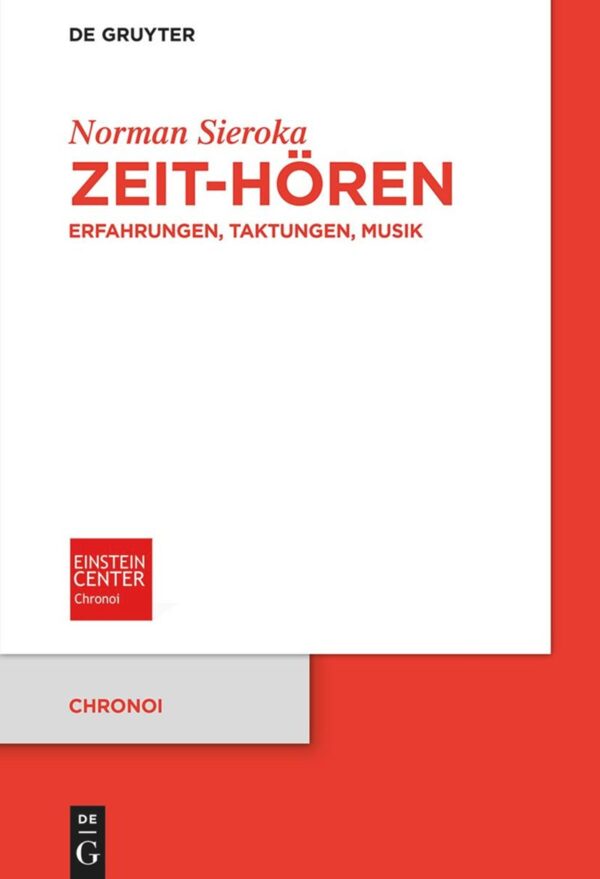 Zeit-Hören: Erfahrungen, Taktungen, Musik
Zeit-Hören: Erfahrungen, Taktungen, MusikObwohl es „die Zeit“ nicht gibt, ordnet sich doch alles, was wir erleben, zeitlich. Auch die großen Schlagworte unserer Tage betreffen allesamt von zeitlichen Herausforderungen: Nachhaltigkeit, Resilienz, Transformation, Zeitenwende.
Dieses Buch handelt davon, was Zeitliches ausmacht, warum sich die Wirklichkeit zeitlich ordnet und was das mit der wechselseitigen Taktung von Ereignissen und Autonomieerfahrungen zu tun hat. Es werden Missverständnisse aufgelöst, indem aufgezeigt wird, inwiefern es „die Zeit“ nicht gibt, es oftmals sogar leidvolle bis hin zu pathologischen Konsequenzen mit sich bringt, wenn Zeit als Gegenstand oder Ressource betrachtet wird. Es ist ein Buch über den Vergleich von Abläufen und darüber, was es bedeutet, wenn Ereignisse miteinander im Takt sind, und wie sie durch Wiederholung und Variation Bedeutung gewinnen und damit „intakt“ wirken.
Musik und vor allem das Hören dienen als Modelle, um diese allgemeinen zeitlichen Struktureigenschaften der Wirklichkeit begrifflich anklingen zu lassen. Darüber hinaus regen Hyperlinks zu konkreten Hörbeispielen dazu an, sich direkt auch auf besondere Erfahrungen von Zeit einzulassen. – Ein Buch für all diejenigen, die Grundlegendes über Zeit nicht nur lesen wollen, sondern sich im Idealfall auch für einen taktvollen Umgang mit Zeit motivieren lassen möchten.
-
 »Everything a Learner Needs« – Constructions Of Linguistic and Social Marginality/Centrality In Discourses about (German) Language Learning and Multilingualism
»Everything a Learner Needs« – Constructions Of Linguistic and Social Marginality/Centrality In Discourses about (German) Language Learning and MultilingualismDer Beitrag befasst sich mit diskursiven Darstellungen der Sprachaneignung und von Sprachenlernenden. Er untersucht in einer Kombination quantitativer und qualitativer Ansätze, ob der Status von Lernenden in aktuellen Diskursen als marginal oder zentral konstituiert wird und ob dies in einigen Belegen als Mimikry von Marginalität […]
-
 Decolonization Through Decolonial Reforming
Decolonization Through Decolonial ReformingThe need for reform of the global health system is openly on the table. Many stakeholders agree that the WHO has not been able to adequately address the political and social problems, global health emergencies triggered or exacerbated by epidemics and pandemics, malnutrition, and access to clean water in recent years. Against this backdrop, there is a widespread call for more equity and solidarity in the global health system.
-
 Working Paper „Einrichtungsantrag Contradiction Studies – Konstellationen, Heuristiken und Konzepte des Widersprüchlichen, Lesefassung“
Working Paper „Einrichtungsantrag Contradiction Studies – Konstellationen, Heuristiken und Konzepte des Widersprüchlichen, Lesefassung“Das Graduiertenkolleg 2686 Contradiction Studies erforscht die Herausbildungen, Aushandlungen und Erklärungsgrenzen von Widerspruch.
Ausgangspunkt ist die Annahme, dass die Ordnungsfigur des Widerspruchs mit dem Gebot der Widerspruchsauflösung häufig in einem Spannungsverhältnis zu alltäglichen Erfahrungen von Widersprüchlichkeiten des Zusammenlebens steht. Konstellationen von Widerspruch, Widerspruchsvermeidung, Widersprüchlichkeiten und Praktiken des Widersprechens werden deshalb systematisch erforscht und als Untersuchungsgegenstände der Geistes-, Sozial- und Rechtswissenschaften etabliert. Das Kolleg verbindet diskurs-, narrations- und textzentrierte Ansätze mit ethnographischen und anderen qualitativ-empirischen Methoden. Auf der Grundlage von Fallstudien und genealogisch oder analytisch orientierten Projekten leistet das Kolleg Begriffs- und Theoriearbeit. Diese zielt darauf, Widerspruch, Widersprüche und Widersprechen in ihren empirischen Konstellationen, heuristischen Funktionen
und ontologischen Dimensionen neu zu bewerten – auch in Antwort auf post- bzw. dekolonial verortete Diskussionen zur Kosmopolitisierung der Wissensproduktion.
-
 Multidirektionale Lexik in der Diskursgeschichte des 20. Jahrhunderts
Multidirektionale Lexik in der Diskursgeschichte des 20. JahrhundertsIn Friedrich Markewitz, Stefan Scholl, Karsten Schubert & Nicole Wilk (eds.), Kommunikative Praktiken im Nationalsozialismus. 173–205. Göttingen: V&R unipress. ISBN: 978-3-7370-1612-4
-
 Agency and Incentives of Diasporic Political Influencers on Facebook Malawi
Agency and Incentives of Diasporic Political Influencers on Facebook MalawiThis article examines the agency and incentives that drive the activism of diasporic political influencers on “Facebook Malawi,” an online imagined political community. In their seminal work on “social media dissidents” and “social media self-made activists” in the Global South, Matsilele and Sharra demonstrate that social media activists engage with different strategies to initiate movements, mobilize citizens, and create their brands in strong opposition to authoritarian regimes which repositions them as freedom fighters in the eyes of the masses and enemies of the state. Correspondingly, we frame diasporic political influencers as actors aided by digital technologies who engage in “long-distance nationalism” on Facebook against authoritarianism in the homeland. We deploy a qualitative mixed methods approach to analyze Facebook data of two diasporic political influencers, Onjezani Kenani and Manes Winnie Hale, who gave informed consent to use their Facebook data generated in 2018 and 2021, a period preceding and following the 2019 Malawi tripartite elections. A thematic analysis of 250 Facebook posts and interview data with the two influencers illustrates how they exercise their agency in their quest for a vision of a better Malawi while navigating a complex and ambivalent web of online and offline threats, incentives, and interests. Implicated in the political communication and mobilization of the two are different strategies that include verbal inventiveness, trolling, and exposing. The article also shows how the concept of long-distance nationalism needs to be adapted in studying diasporic political influencers.
-
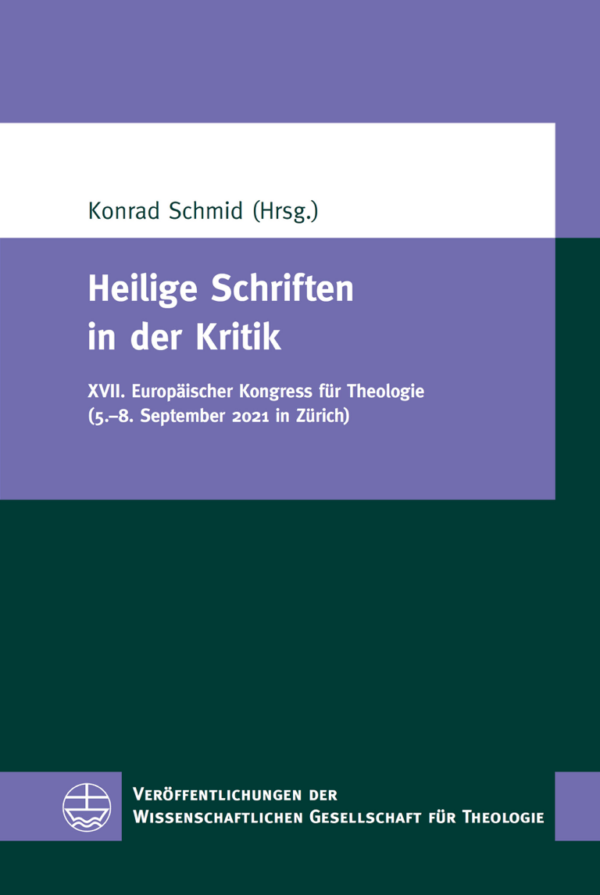 Aristokratie der Buchreligionen? Heilige Schriften aus religionswissenschaftlicher Perspektive
Aristokratie der Buchreligionen? Heilige Schriften aus religionswissenschaftlicher PerspektiveIn Konrad Schmid (ed.) Heilige Schriften in der Kritik. XVII. Europäischer Kongress für Theologie (5.-8. September 2021 in Zürich). 643-658. Leipzig: Evangelische Verlagsanstalt. DOI: 10.5771/9783374072286
-
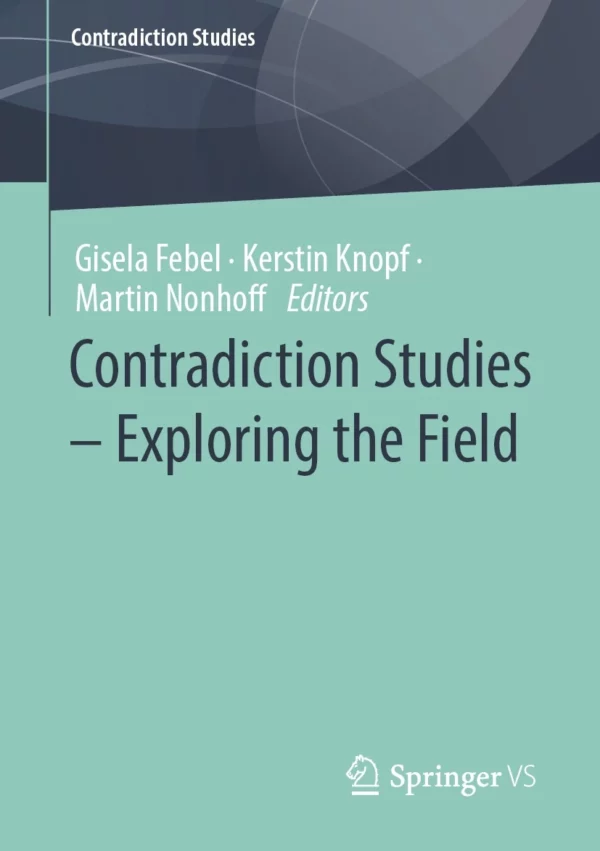 Contradiction Studies – Exploring the Field. An Introduction
Contradiction Studies – Exploring the Field. An IntroductionSince antiquity in Greece, the Law of Non-Contradiction (LNC) is considered to be the foundation of all philosophy. As Aristotle maintains in Metaphysics, “the same attribute cannot at the same time belong and not belong to the same thing and in the same respect” (1005b, 19–23).
-
 Corps et capital dans le roman français du XIXe siècle. Körper und Kapital im französischen Roman des 19. Jahrhunderts
Corps et capital dans le roman français du XIXe siècle. Körper und Kapital im französischen Roman des 19. JahrhundertsDer lebendige Körper und das kapitalistische Denken der modernen Ökonomie scheinen unvereinbare Gegenstände zu sein. Dennoch sind ihre Geschichte und Wahrnehmung spätestens seit der Zeit der Industrialisierung und Kapitalisierung im 19. Jahrhundert untrennbar miteinander verbunden. Unser Band betrachtet diese verflochtene Geschichte und die verschiedenen Widersprüche, die sich daraus entwickeln.
Seit Pierre Bourdieu wissen wir, dass der Körper ein inkorporiertes kulturelles und soziales Kapital darstellt. Er ist eine Ware und ein Produktionsmittel, ein Zeichen der Zugehörigkeit zu einer sozialen Klasse, ein Ort, an dem Geschlechter- und Machtverhältnisse ausgehandelt werden oder ein Vorwand für soziale Ausgrenzung und Rassismus. Der Körper ist Gegenstand von Bestrafungen, Sanktionen und sozialer Kontrolle, Träger von Affekten, Obsessionen und Krankheiten sowie Ort der Rebellion und des Widerstands. All das erzählen die Romane des 19. Jahrhunderts, die in den Beiträgen dieses Bandes analysiert werden. Aus der Perspektive der aktuellen Body Studies schlagen wir eine neue Lesart der großen Geschichten von Balzac bis Zola über Mirbeau, Maupassant, Louise Michel, Georges Sand, Rachilde, Eugène Sue und Huysmans vor, um anhand ihrer Texte zu zeigen, wie die Bilder vom Körper und die Politik des Kapitals miteinander verflochten sind und so einen zentralen Teil der Vorstellungswelt und des Gedächtnisses der französischen (wie auch der nördlichen/westlichen) Gesellschaft des 19. Jahrhunderts bildet.
-
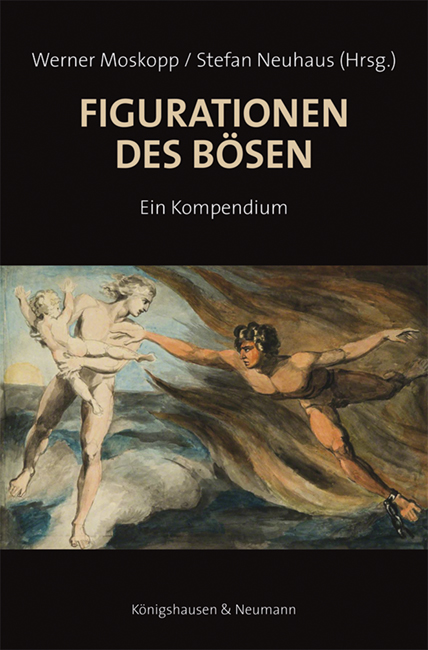 Hagen von Tronje: Vom Antagonist zum Bösewicht zum Antiheld. Überlegungen zur diachronen Entwicklung und Rezeption einer Antagonistenfigur
Hagen von Tronje: Vom Antagonist zum Bösewicht zum Antiheld. Überlegungen zur diachronen Entwicklung und Rezeption einer AntagonistenfigurIn Moskopp, Werner & Stefan Neuhaus (Hrsg.), Figurationen des Bösen. Ein Kompendium, 185-198. Würzburg: Königshausen & Neumann.
-
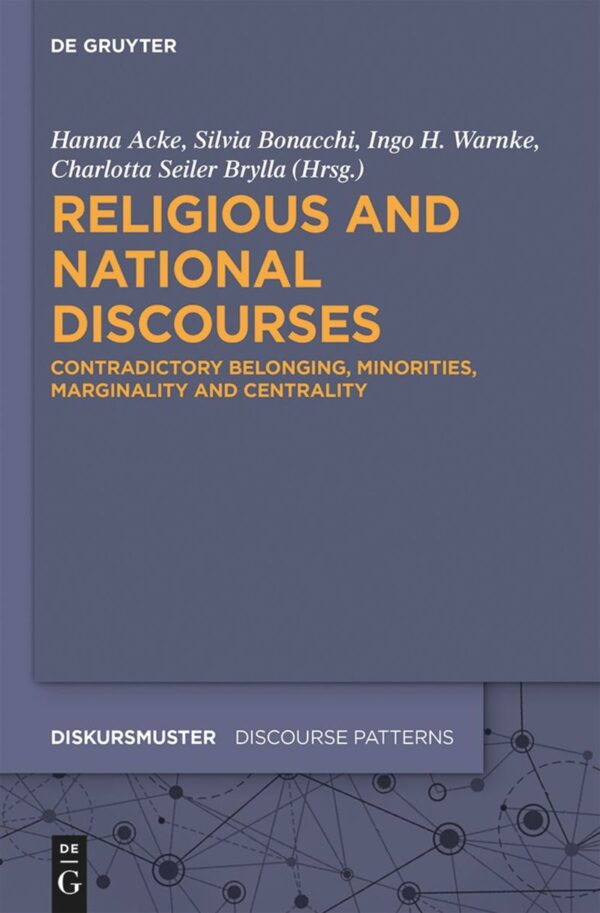 Minorities and Majorities, Marginality and Centrality. An Introduction
Minorities and Majorities, Marginality and Centrality. An IntroductionIn Hanna Acke, Silvia Bonacchi, Carsten Junker, Charlotta Seiler Brylla & Ingo H. Warnke (eds.), Religious and national discourses. Berlin/Boston: de Gruyter Band 33 der Reihe Diskursmuster/Discourse Patterns eBook ISBN: 9783111039633 PrintISBN: 9783111027739
-
 Die Region Bremen. Herausforderungen der regionalen Verflechtung der Stadt Bremen mit ihrem niedersächsischen Umland
Die Region Bremen. Herausforderungen der regionalen Verflechtung der Stadt Bremen mit ihrem niedersächsischen UmlandArbeit und Wirtschaft in Bremen (43).
-
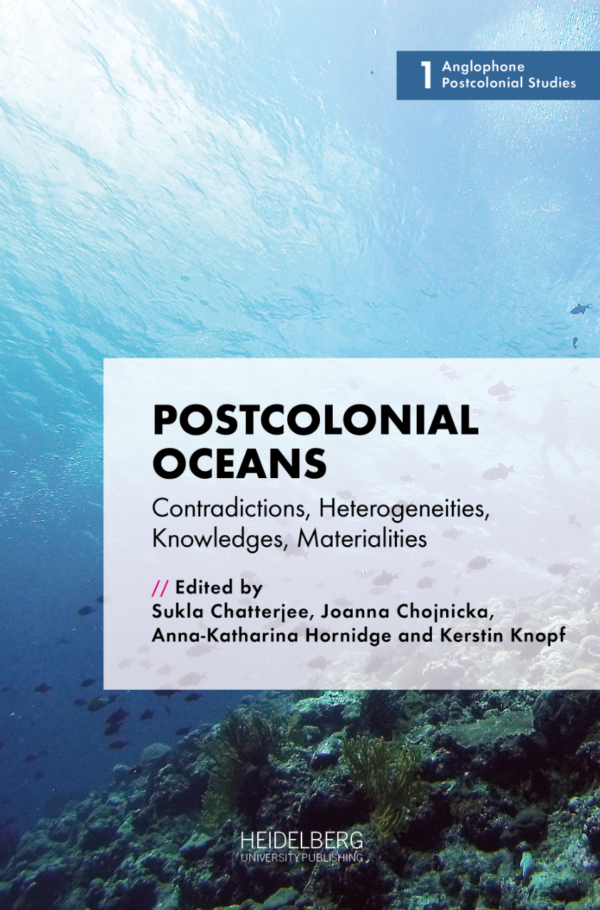 The Colonial Making of Bremen’s Peri-Urban Port Area
The Colonial Making of Bremen’s Peri-Urban Port AreaIn Chojnicka, Joanna & Hornidge, Anna-Katharina & Knopf, Kerstin & Chatterjee, Sukla (eds.) Postcolonial Oceans: Contradictions, Heterogeneities, Knowledges, Materialities, 219-236. Heidelberg: Heidelberg University Publishing. DOI: 10.17885/heiup.1046.c17310
-
 Making a Theme Audible. Imparting Non-Discursive Knowledge in Natural Philosophy by Means of Poetry and Aphorism
Making a Theme Audible. Imparting Non-Discursive Knowledge in Natural Philosophy by Means of Poetry and AphorismDieser Aufsatz beschäftigt sich mit Poesie als einem Instrument zur Vermittlung von Wissen in der Naturphilosophie. Es wird der erkenntnistheoretische und kulturelle Hintergrund erörtert, vor dem frühgriechische Denker wie Parmenides und Empedokles in Versen schrieben, und es wird untersucht, warum die Versform als bevorzugtes Mittel zur Vermittlung wichtiger und oft nicht-diskursiver Erkenntnisse über die Natur angesehen wurde. Es geht insgesamt darum, wie Poesie „ein philosophisches Thema hörbar“ machen sollte, um eine Einsicht hervorzurufen, die ein großes Erfahrungsfeld strukturiert. Sehr viel später finden ähnliche Überzeugungen eine (letzte) Blütezeit in Goethes Versuch, ein Naturgedicht im lukrezischen Sinne zu schreiben. Auch wenn neue Erkenntnisse vor allem aus der klassischen deutschen Philosophie auf Goethe einwirkten, zeigen seine Beweggründe, weiterhin Naturdichtung betreiben zu wollen, auffallende Kontinuitäten zu den Denkern der Antike. Der Aufsatz endet mit einer kurzen Darstellung späterer Versuche, weiterhin „philosophische Themen hörbar“ zu machen, während gleichzeitig die Fragmentierung von Wissen zunimmt.
-
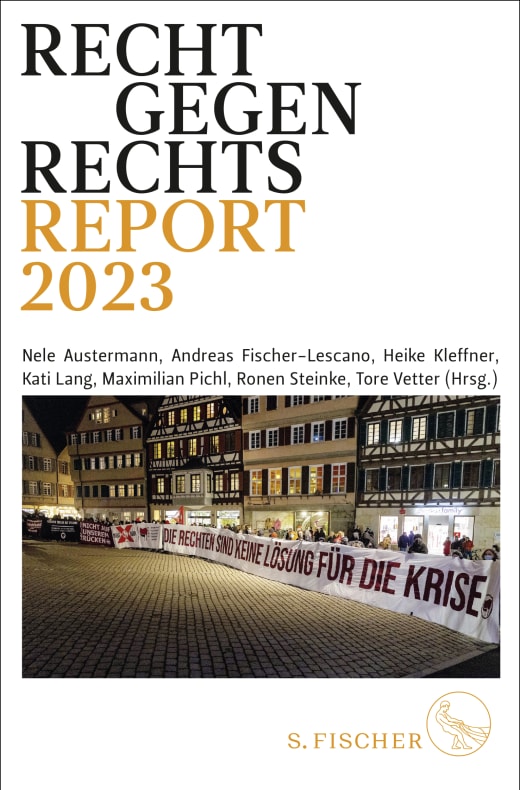 Babycaust? Keine Volksverhetzung! Die deutsche Justiz versagt bei der Bekämpfung von Holocaustverharmlosung und Aufstachelung zum Hass
Babycaust? Keine Volksverhetzung! Die deutsche Justiz versagt bei der Bekämpfung von Holocaustverharmlosung und Aufstachelung zum HassIn Nele Austermann, Andreas Fischer-Lescano, Heike Kleffner, Kati Lang, Maximilian Pichl, Ronen Steinke, & Tore Vetter (Hrsg.), Recht gegen rechts, 307–314. Frankfurt am Main: S. Fischer.